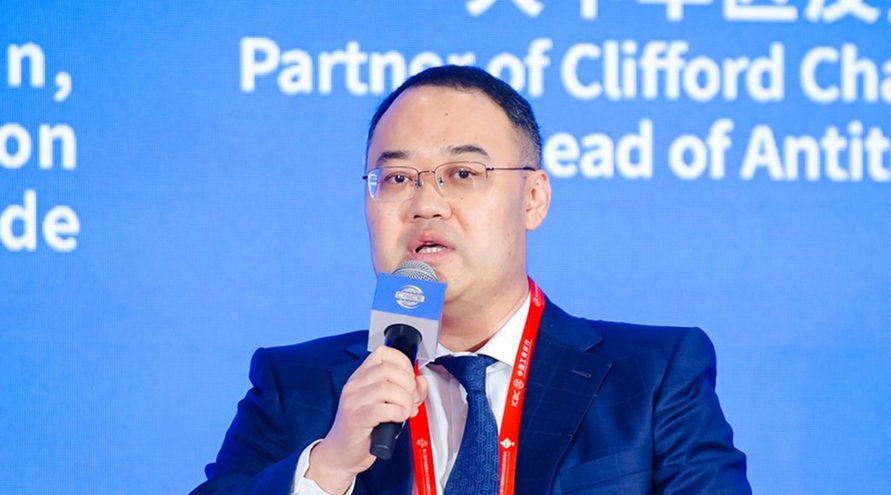Renowned antitrust lawyer Bai Yong said Wednesday at the China International Supply Chain Expo (CISCE) in Beijing that China has strengthened global supply chains amid rising worldwide protectionism, serving as an outstanding model to the world's economies.

Renowned antitrust lawyer Bai Yong speaks at an event during the 3rd CISCE in Beijing on July 16, 2025. [Photo courtesy of CISCE]
"I believe the Chinese government has delivered exceptional performance in recent years, providing positive contributions to global supply chain stability and security," said Bai, a partner at international law firm Clifford Chance and head of antitrust for Greater China. "Personally, I find it remarkable that while China was relatively closed 40 years ago when the world was more open. Through decades of development, China has become increasingly open. Meanwhile, we observe many countries outside China, including those in Europe and America, becoming more closed with rising protectionism."
Bai said that years ago, the Chinese government co-launched international initiatives on industrial and supply chain resilience with Indonesia and other nations, while actively advancing these agendas across BRICS, G20, and other platforms. The China Council for the Promotion of International Trade (CCPIT) has facilitated over 2,200 business delegations in their visits to more than 100 countries in 2024, aiming to improve international cooperation. CCPIT is also continuing to host the CISCE in its third year, and the platform is demonstrating a growing influence.
"China's approach both encourages domestic enterprises' global expansion and welcomes foreign investment, establishing an exemplary model for international economic cooperation," he said.
Bai said the fundamental purpose of antitrust law is to protect competition. "Competition drives enterprises to improve quality, reduce prices, foster innovation and enhance product diversity, ultimately expanding consumer choice," he said. "This process strengthens supply chain diversity, stability and resilience. Fair competition constitutes the essential foundation for supply chain stability."
But the antitrust expert has observed that overseas, particularly as Chinese companies expand globally, many European and American governments have incorporated geopolitical and protectionist considerations into their antitrust enforcement.
"For example, they dismiss Chinese companies' efficiency and innovation, attributing their competitive advantage solely to subsidies," Bai said. "In reality, all governments provide subsidies, and all companies receive them – so why should Chinese companies face particularly harsh, unfair, and discriminatory treatment? This reflects the inequitable approach to Chinese firms in foreign antitrust enforcement. Such practices dampen investment confidence by creating uncertainty, ultimately undermining supply chain stability and security."
He continued, "Many governments in the world should reflect on this issue. When a government abandons fair market principles for protectionist enforcement, it directly jeopardizes global supply chain stability and security."
Bai suggested that the essence of today's globalization lies in restructuring global supply chains. He expressed hope that the Chinese government and businesses would continue to play, and expand, their pivotal role as stabilizing forces in maintaining globalization and ensuring the security and stability of global industrial chains.
"From a corporate perspective, businesses worldwide – especially Chinese companies – should proactively engage in developing and restructuring global supply chains to strengthen international competitiveness," he said. "We encourage Chinese enterprises with overseas operations to communicate China's story effectively to foreign regulators, helping dispel misunderstandings. Chinese companies must also maintain strategic vigilance by expanding their global industrial chain role and competitiveness, ensuring sustained advantages through international cooperation and broader global operations."
The third CISCE, hosted by the China Council for the Promotion of International Trade, opened Wednesday in Beijing and runs through Sunday. As the world's first national-level expo focused on supply chains, it has become a key platform for international business cooperation and shared development.


 Share:
Share: 




 京公網安備 11010802027341號
京公網安備 11010802027341號